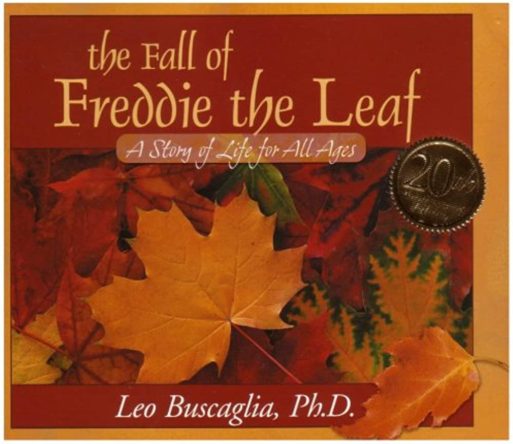 When it comes to story time with your little one, death is maybe the last thing you want to read about (other than Eloise’s adventures at the Plaza for the hundredth time!). You know it’s an important topic to introduce, yet the thought of your children’s already-too-fleeting innocence being infringed upon by such heavy, adult concepts tugs at your heart. However, learning about death and loss of innocence don’t have to be at odds. Books like The Fall of Freddie the Leaf: A Story of Life for All Ages are told with such warmth and gentleness that children who read (or hear it read to them) will feel soothed and intrigued, not overwhelmed or frightened. Dr. Buscaglia uses simple but profound language to narrate the life cycle of the titular Freddie and his maple-shaped friends. Together the little leaves bask in the summer sun, change into beautiful colors in autumn, and most importantly learn about their lives’ purpose, as well as its inevitable end.
When it comes to story time with your little one, death is maybe the last thing you want to read about (other than Eloise’s adventures at the Plaza for the hundredth time!). You know it’s an important topic to introduce, yet the thought of your children’s already-too-fleeting innocence being infringed upon by such heavy, adult concepts tugs at your heart. However, learning about death and loss of innocence don’t have to be at odds. Books like The Fall of Freddie the Leaf: A Story of Life for All Ages are told with such warmth and gentleness that children who read (or hear it read to them) will feel soothed and intrigued, not overwhelmed or frightened. Dr. Buscaglia uses simple but profound language to narrate the life cycle of the titular Freddie and his maple-shaped friends. Together the little leaves bask in the summer sun, change into beautiful colors in autumn, and most importantly learn about their lives’ purpose, as well as its inevitable end.
Children who relate to Freddie’s initial reaction will be comforted along with him by the reiteration that all phases of life are unknown until we experience them. Why should death be any different?
Far less dreary than it sounds, this concept is introduced in a calm, matter-of-fact manner, in which death is depicted as simply one more natural phase of life. Although the tone is reassuring, it isn’t unrealistic. Freddie expresses fear of the unknown, which his wise old friend assures him is to be expected. Children who relate to Freddie’s initial reaction will be comforted along with him by the reiteration that all phases of life are unknown until we experience them. Why should death be any different? The story ultimately culminates in Freddie’s dignified, even joyful passing, as he closes his eyes in the shadow of his beloved tree home and the embrace of new leaves who are soon to be born.
Parents wary of religious overtones need not worry. Freddie, while told with reverent cadence that feels vaguely spiritual, is decidedly non-denominational, not delving into ideas of afterlife or creator. However, parents who wish to incorporate these concepts could easily do so in context of the story. Dr. Buscaglia demonstrates a comforting air of authority in his storytelling without ever becoming preachy or grating. This deft and effective balance is perhaps the reason this beautifully illustrated book has become a modern classic, popular for over twenty years with parents, caretakers and teachers faced with the daunting task of explaining death to a child.
There are a few universal, profoundly human experiences that transcend age; smiling at the idea of a brave little leaf floating gently in the breeze before meeting whatever comes next is certainly one of them.
In fact, Freddie is such a relatable character, (in spite of his, well, leafiness) that adults could easily identify with, derive comfort from his journey to understand, and eventually embrace his own mortality. There are a few universal, profoundly human experiences that transcend age; smiling at the idea of a brave little leaf floating gently in the breeze before meeting whatever comes next is certainly one of them.

 “The Fall of Freddie the Leaf: A Story of Life for All Ages” by Leo Buscaglia, PhD
“The Fall of Freddie the Leaf: A Story of Life for All Ages” by Leo Buscaglia, PhD



 Funeral Favors Offer Visitors a Tangible Memento
Funeral Favors Offer Visitors a Tangible Memento
 “Comeback” by Prince
“Comeback” by Prince















